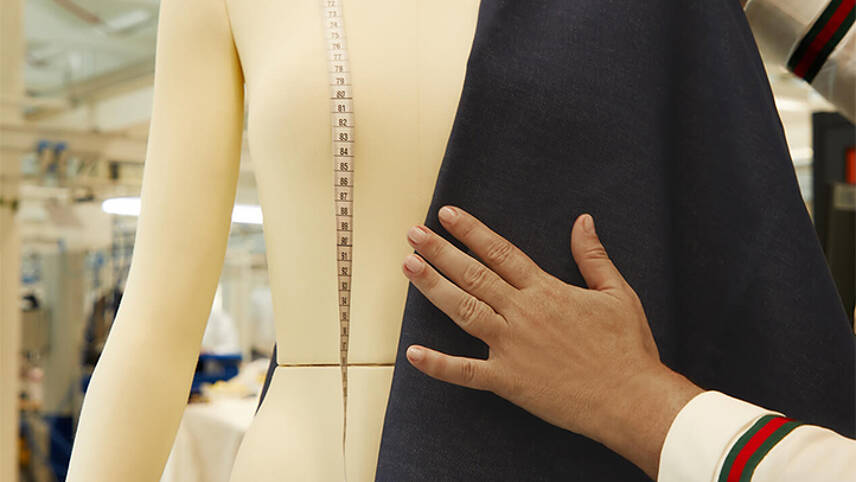This premium content is exclusive to edie Members.
To find out more about edie Membership, please click below.
If you are an existing member, login here

Image: Gucci
At a glance:
Who: Gucci, owned by Kering
What: Denim garments designed using circular economy principles
Where: Award presented in Milan
When: Award presented September 2023, collection on sale early 2024
Why: To showcase innovations that could be used to tackle fashion’s waste problem
The challenge
The Ellen MacArthur Foundation estimates that just 2% of the garments produced globally each year are recycled into new fashion or textile products. The vast majority will eventually end up landfilled, dumped or burned – and the length of time for which clothing is kept in use is decreasing.
There is, as such, a need to produce clothing that is more durable and to scale systems enabling repair, reuse and resale. There is also a need to reduce the environmental impact of fashion supply chains.
The solution
Gucci’s ‘Denim Project’ has focused on developing jeans and other garments that include lower-impact materials and are easy to care for, repair and reuse.
The luxury fashion house has created products which incorporate cotton grown using regenerative methods alongside recycled content. The products also come with enhanced information on care and repair.
How the project works
Gucci’s parent company Kering has run a Material Innovation Lab for more than a decade.
Building on the Lab’s work to date, the brand worked with partners International Promo Studio, Candiani Denim, and Filatura Astro to develop denim garments comprising 26% recycled denim fibres and 74% regeneratively-grown cotton fibres.
The cotton is grown at the Algosur farm in Spain, which has been certified as regenerative under the Regenagri scheme. The post-consumer recycled fibres were collected and re-spun in Italy and have also been subject to third-party certification.
Each of the garments made using these materials will come with a digital product passport. This will include information tracing the raw materials back through the supply chain, from origin to manufacturing and production, all logged onto a tamper-proof blockchain.
Items will also come with digital and physical copies of information relating to garment care and accessing repair services.
Items made through Gucci’s ‘Denim Project’ will be available to purchase as limited edition lines from early 2024.
The results
Gucci beat Chloe and ACS Clothing to win the award at the 2023 Camera Nazionale della Moda Italiana (CNMI) Sustainable Fashion Awards, which were hosted during Milan Fashion Week.
The Award synopsis claims it exists to recognise brands which are embedding circular economy principles in their work and also taking wider actions to improve their environmental impact.
Chloe had also entered the Award for its work on sustainable denim. It has taken part in the Jeans Redesign programme run by the Ellen MacArthur Foundation and changed almost all of its portfolio to improve durability and traceability while incorporating more recycled materials.
Gucci has previously invested in regenerative-certified wool from a sheep farm in Uruguay, which contributed to its winning of the CNMI award for Climate Action in 2022.
Business benefits
Gucci’s ‘Denim Project’ garments are not yet on sale so we cannot tell whether this collection will sell well and receive positive reviews.
Nonetheless, the award win serves to boost Gucci’s reputation among its customer and investor base, and the innovations it is pioneering could, in time, be extended to its wider product portfolio.
Gucci’s parent company Kering is widely renowned for having some of the most ambitious environmental targets in the global luxury fashion industry. It is aiming to halve emissions across all scopes by 2025, against a 2017 baseline. It is also working towards full supply chain transparency by 2025 and has set out stricter standards for working conditions, chemical products and more within this timeframe.
The Denim Project undoubtedly feeds into the delivery of these goals. It also contributes to Kering’s commitment to “imagine disruptive innovation”.
Industry context
Fashion is an industry that comes with complex supply chains that have, historically, harmed the environment and people. These supply chains are notoriously hard to trace. This has been true of luxury brands and budget high-street retailers alike.
Shoppers are now demanding far more information on the fashions they buy, especially when they are buying at a luxury price point. There are now Positive Luxury awards and the eponymous organisation has observed a shift in the definition of luxury. Where, once, it meant obtaining rare products regardless of environmental impact (think of products made using animal skins), it now means obtaining beautifully designed products that also have benefits for people and the planet.
Many brands, luxury and otherwise, are now looking to digital solutions to provide product traceability. In 2021, IBM and the UK Fashion and Textile Association jointly launched a pilot assessing the use of digital tracking in supply chains. Participants included H&M Group and Next. Burberry also collaborated with IBM with the same aim in 2020.
Gucci is also one of many brands looking to regeneratively grown materials. Other proponents include Burberry, Stella McCartney, Zalando, Giorgio Armani and Patagonia.
These practices are still the exception rather than the norm.
© Faversham House Ltd 2024 edie news articles may be copied or forwarded for individual use only. No other reproduction or distribution is permitted without prior written consent.

